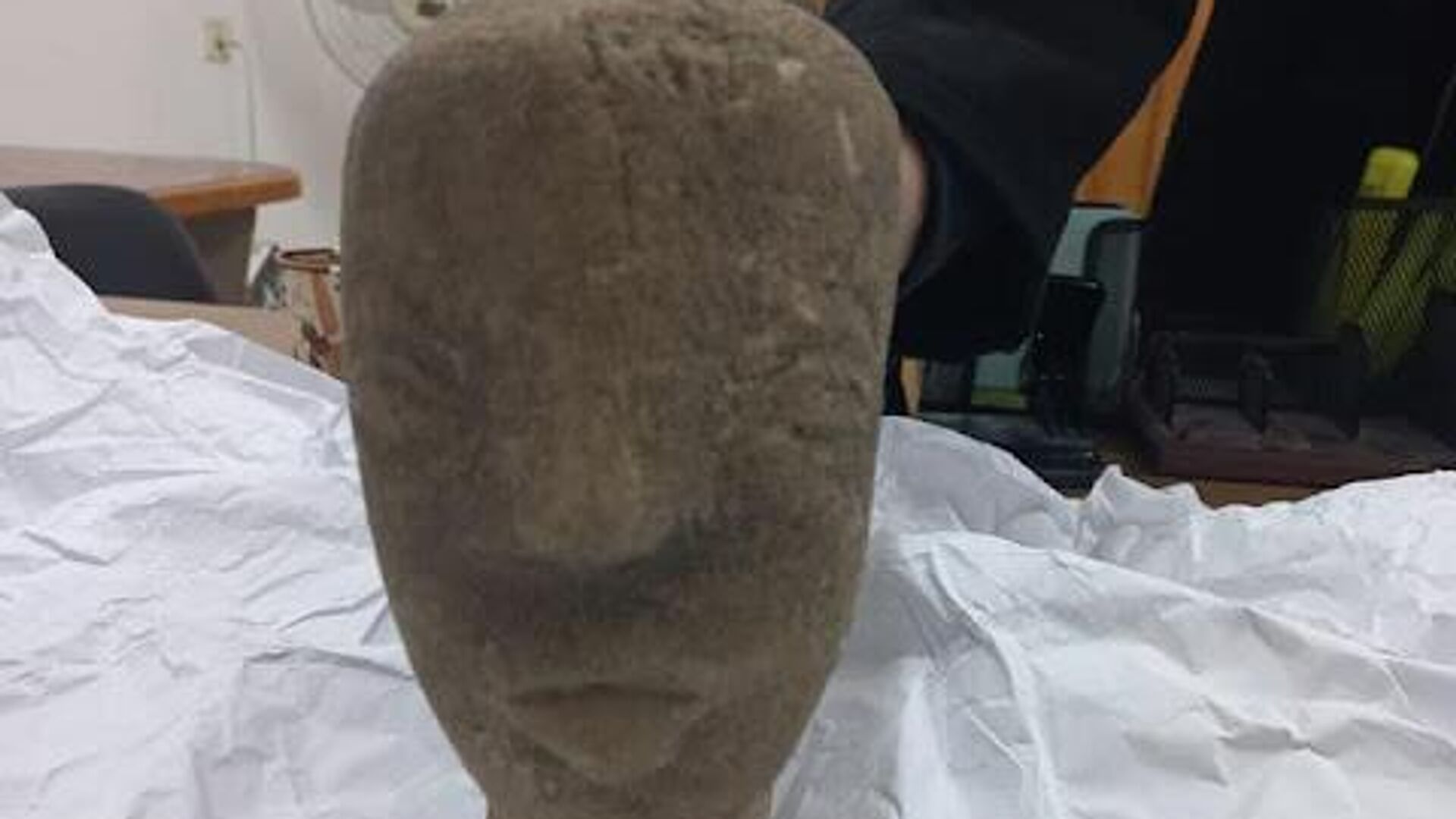https://sputnikglobe.com/20220427/photos-4500-year-old-statue-of-the-goddess-of-love-beauty--war-found-in-gaza-strip-1095111545.html
Photos: 4,500-Year-Old Statue of the Goddess of Love, Beauty & War Found in Gaza Strip
Photos: 4,500-Year-Old Statue of the Goddess of Love, Beauty & War Found in Gaza Strip
Sputnik International
The Canaanite civilization existed from roughly 3500-1150 BC in Canaan, which included parts of modern-day Syria, Lebanon, Palestine, Israel and Jordan... 27.04.2022, Sputnik International
2022-04-27T22:57+0000
2022-04-27T22:57+0000
2024-01-30T10:26+0000
statue
gaza strip
ancient
antiquities
blockade
palestine
https://cdn1.img.sputnikglobe.com/img/07e6/04/1b/1095111480_0:147:481:417_1920x0_80_0_0_4615a05182c9b771f07d165161b77fed.jpg
A farmer in the Gaza Strip has dug up a 4,500-year-old statue of the ancient goddess Anat.Nidal Abu Eid says he was plowing his land in the Qarara area east of Khan Tunis in the southern portion of the Gaza Strip. He saw the top of the 8.7-inch statue sticking out of the ground and picked it up.Anat was the Canaanite goddess of love, beauty and war, and likely served as inspiration for the Greek goddess of war, Athena, who was also commonly depicted with snakes.The limestone statue has been dated to around 2,500 BC, or the later-era Bronze Age. It is now on display at Wasr al-Basha, a small museum in Gaza.Abu Eid says he did not consider selling the item, deciding instead to donate it because it belongs to the Palestinian people. For him, the statue has not only historical significance but geopolitical implications as well.Canaanites are thought to have worshiped local deities in local temples, so finding depictions of their gods is extremely rare.While the announcement was made by the Hamas-run Palestinian Ministry of Tourism and Antiquities, the Gaza Strip does not see a significant stream of tourists. Israel and Egypt strictly control the flow of people and materials going in and out of the embattled era, having imposed a blockade on the territory since 2007 that has been devastating for the people living there.
gaza strip
palestine
Sputnik International
feedback@sputniknews.com
+74956456601
MIA „Rosiya Segodnya“
2022
News
en_EN
Sputnik International
feedback@sputniknews.com
+74956456601
MIA „Rosiya Segodnya“
Sputnik International
feedback@sputniknews.com
+74956456601
MIA „Rosiya Segodnya“
statue, gaza strip, ancient, antiquities, blockade, palestine
statue, gaza strip, ancient, antiquities, blockade, palestine
Photos: 4,500-Year-Old Statue of the Goddess of Love, Beauty & War Found in Gaza Strip
22:57 GMT 27.04.2022 (Updated: 10:26 GMT 30.01.2024) The Canaanite civilization existed from roughly 3500-1150 BC in Canaan, which included parts of modern-day Syria, Lebanon, Palestine, Israel and Jordan. Records and archaeological finds are rare, with most information about the Canaanites coming from other civilizations who came into contact with them.
A farmer in the Gaza Strip has dug up a 4,500-year-old statue of the ancient goddess Anat.
Nidal Abu Eid says he was plowing his land in the Qarara area east of Khan Tunis in the southern portion of the Gaza Strip. He saw the top of the 8.7-inch statue sticking out of the ground and picked it up.
“What caught our attention is the inscription of the snake on the head, which means it is very important.” In Canaanite mythology, snakes are a symbol of strength and invincibility.
Anat was the Canaanite goddess of love, beauty and war, and likely served as inspiration for the Greek goddess of war, Athena, who was also commonly depicted with snakes.
The limestone statue has been dated to around 2,500 BC, or the later-era Bronze Age. It is now on display at Wasr al-Basha, a small museum in Gaza.
Abu Eid says he did not consider selling the item, deciding instead to donate it because it belongs to the Palestinian people. For him, the statue has not only historical significance but geopolitical implications as well.
“This statue documents the history of the Palestinian people on this land and that its origins are Canaanite,” Abu Eid said at a press conference announcing the discovery. “Such discoveries prove that Palestine has civilization and history, and no one can deny or falsify this history. This is the Palestinian people and their ancient Canaanite civilization.”
Canaanites are thought to have worshiped local deities in local temples, so finding depictions of their gods is extremely rare.
While the announcement was made by the Hamas-run Palestinian Ministry of Tourism and Antiquities, the Gaza Strip does not see a significant stream of tourists. Israel and Egypt strictly control the flow of people and materials going in and out of the embattled era, having imposed a blockade on the territory since 2007 that has been devastating for the people living there.
Still, the discovery offers a sense of pride for Abu Eid and the Palestinian people. "We thank God, and we are proud that it stayed in our land, in Palestine, since the Canaanite times," he said at the press conference.



